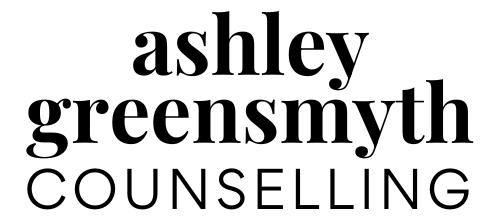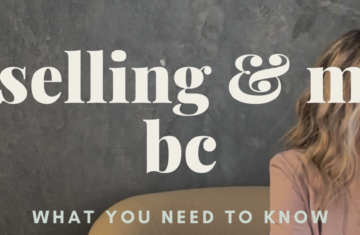Fundamentally Human: Depression and Anxiety
I was recently asked to be a guest on the Fundamentally Human podcast series. In this podcast, Shirvin Lee takes mental health concepts and breaks them down into easy-to-understand pieces. Shirvin asked me to join her talk about depression and anxiety, treatment approaches, how to support loved ones, and when to seek help. This blog will be a bit of a transcript/overview of our conversation. You can listen to the full interview on her podcast.
Click to Read More Anxiety Posts
The Relationship Between Anxiety and Depression
Anyone who has worked with me has probably heard me describe depression and anxiety as being opposite points on a mood spectrum. There is always some imagined goal that fuels the experience of anxiety or depression. The goal could be, “I must be perfect,” or, “I want to impress my parents,” or something like that. Approaching this goal to its extremes can result in feeling disappointed, let down, and depressed, or worried, fearful of failure, and anxious.
Imagine yourself running up an escalator and the stairs are moving in the opposite direction. I’ve done this for fun as an adolescent, and it’s really difficult. Your heart rate increases, you might break into a sweat, or feel short of breath. That’s similar to anxiety. Naturally, you can’t keep this energy going endlessly. But what if you really wanted to get to the top of the escalator no matter what? Even though no matter how hard you tried, you could never reach the top? You might begin to feel disappointed, frustrated with your dwindling energy, let down, mad at the whole situation in the first place. This is like depression.
This isn’t a perfect metaphor, but it’s a helpful illustration. Depression and anxiety have different symptoms, so people can experience anxiety and depression at the same time. And they are also like different points on a spectrum. Often, anxiety happens first, and the impact of anxiety on a person’s life can lead to the development of depression.
 Photo by Silvestri Matteo on Unsplash
Photo by Silvestri Matteo on Unsplash
The Connection Between Anxiety and Depression
Anxiety and depression are connected because they relate to the same neurotransmitters like cortisol (the stress hormone) and GABA (which helps to regulate the nervous system). Both disorders also involve a lot of negative thinking. Anxiety is often focused on fears about the future and the what if’s. People with depression often see the future as hopeless. In both disorders, there can be a dwelling on past events. People who experience anxiety and people who experience depression also believe that the worst-case scenario is most likely to happen.
Is a Diagnosis Required for Counselling?
 Assessing Severity of Depression and Anxiety
Assessing Severity of Depression and Anxiety
Whether someone has a diagnosis or not, assessments help to form a baseline of mood and understand where distress is coming from. There are several assessments that I choose from depending on how a person describes situation.
I also encourage people to talk to their family doctor about mood. Naturopathic doctors can also be a helpful resource for assessing and discussing treatment options. In taking an holistic approach, I always talk about factors like CATS (caffeine, alcohol, tobacco, sleep), recreational substance use, nutrition, activities, and social supports.
Overview of Treatment for Depression and Anxiety
I use a many approaches to treating depression and anxiety. This usually begins with CBT techniques to address the most distressing symptoms. I discuss self-care and stress reduction to establish healthy routines with clients. Some CBT techniques for working with depression are scheduling enjoyable activities, setting up functional routines, and connecting with supports. For anxiety, I incorporate mindfulness and breathing exercises. We also explore automatic negative thoughts, cognitive biases, and practice disputing negative thoughts. Journaling or keeping a log of negative thoughts and negative beliefs can be helpful to analyze the inner monologue. In fact, this kind of self-reflection can be the greatest change in therapy. I also like to incorporate apps like Alarmy, MindShift, BeatPanic, and Relax Melodies.
 Photo by Matteo Raw on Unsplash
Photo by Matteo Raw on Unsplash
When Do I Need Support?
If you’re questioning whether you should look for support, now is a good time to start. Speaking with a mental health professional can help you clarify your need for therapy and create goals. You can also get a sense of how severe your symptoms are. Some warning signs for depression include social withdrawal, excessive sleep, thinking excessively negative, experiencing low mood most days for a period of two weeks. Suicidal ideation is another strong sign for seeking help.
Warning signs for anxiety can include irrational fear, uncertainty, panic attacks, obsessive thoughts and rumination, compulsive behaviors, and feeling restless and on edge. Assessments will look at a one month period, however there’s no need to suffer if you are feeling out of control and unable to regulate yourself.
Looking at self-help resources can be an introduction into seeking help. Websites like AnxietyCanada.com and the CMHA.ca can be a helpful starting place. You can also sign up for a free, online program called Bounce Back (bouncebackbc.ca). Bounce Back is a CBT based program for anxiety, depression, and stress management.
 Photo by Jakob Owens on Unsplash
Photo by Jakob Owens on Unsplash
How To Support A Loved One with Depression or Anxiety
If you suspect a friend or loved one is experiencing depression or anxiety, let them know their feelings are valid. Don’t rush to provide advice or try to problem solve. I know it’s hard to see someone you care about to be suffering, but even the best advice is unlikely to be taken. If you feel strongly about giving advice, ask if they’re open to receiving suggestions.
Offer tangible support like inviting them to spend time together. If it’s appropriate, just show up and spend time together. Send takeout to their house, have a phone call or FaceTime conversation instead of text messaging to connect.
Your loved one might not be aware of their symptoms, so they might be defensive. Providing emotional support and social support can be more helpful than you know, whether someone is aware of their symptoms or not.
 Photo by Aejaz Memon on Unsplash
Photo by Aejaz Memon on Unsplash
How Do I Explain How That I’m Feeling Anxious or Depressed?
It’s not unusual for individuals and families to have a stigma about mental health, seeing a therapist, even taking medication. Some people believe “mental health” is a description for brain disease or mood extremes only. The reality is that everyone has mental health just like everyone has dental health. You can describe your symptoms to others. Explain that you’re feeling down a lot, or that you’re worrying about a lot of things and it’s not just stress.
More people experience anxiety and depression than you might think.
Depression and anxiety are among the most widely experienced mental health disorders. Every human on this earth has mental health and experiences struggles, growth, discomfort, and also a lot of positive things. After all, that’s what makes us fundamentally human.
Curious about therapy for anxiety and depression?
Schedule your first appointment today.
Book


